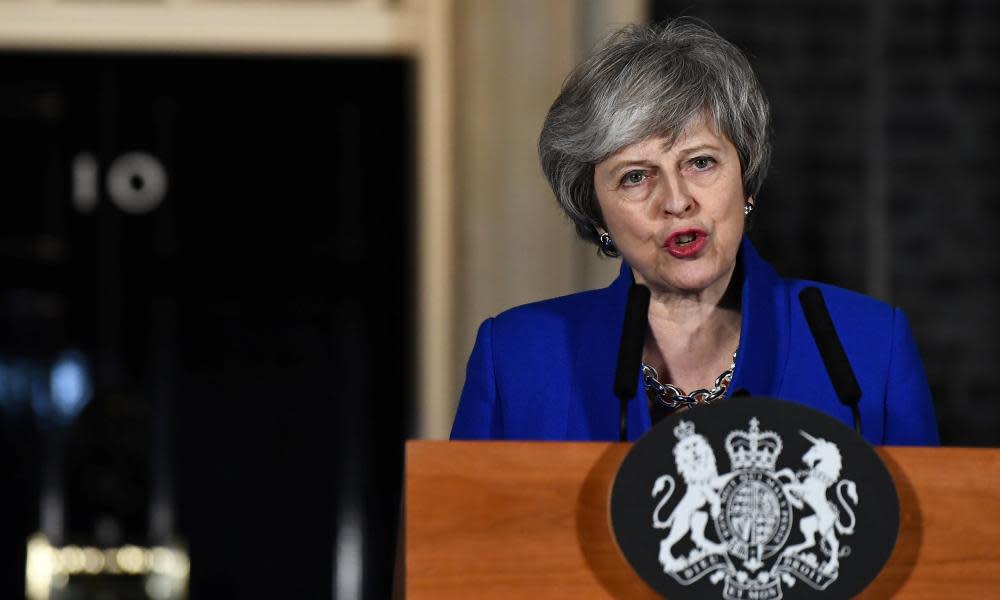MPs to ambush May with amendments to stop no-deal Brexit

MPs are to ambush Theresa May’s statement on Monday with amendments aimed at stopping a no-deal Brexit, as well as paving the way for “indicative votes” to show whether any proposal can command a parliamentary majority.
The Labour frontbench is undecided as to whether to back either proposal. Yvette Cooper, chair of the home affairs select committee, is planning to put down a tightly worded amendment to give time for a bill which would give parliament the power to back an extension of article 50.
The move has been devised by the former Tory minister Nick Boles, with the support of other Tories such as Sir Oliver Letwin and Nicky Morgan and the Labour chair of the Brexit select committee Hilary Benn.
However, another more radical amendment by the former attorney general Dominic Grieve would allow a motion put forward by a minority of 300 MPs from at least five parties — including 10 Tory MPs — to be debated as the first item for MPs in the Commons the next day.
Grieve’s amendment would in effect give parliament the power to hold “indicative votes” on which Brexit options can command a majority in parliament, such as a Norway-style deal or a second referendum. Previously a majority has been needed to push forward such debates.
Both camps indicated they intend to table their amendments as soon as possible on Monday, following the expected motion from the prime minister laying out the next stage of the government’s Brexit plan.
MPs hoping to stop no-deal are set to meet in Benn’s parliamentary office before the prime minister’s statement on Monday afternoon, when she is also expected to lay a “neutral motion” which sets out the next phase of her plan to get her deal through.
A No 10 spokesman said there was deep unease at the wider implications of such amendments. “Any attempt to remove the government’s power to meet the legal conditions of an orderly exit at this moment of historic significance is extremely concerning,” he said.
“This news should serve as a reminder to those MPs who want to deliver Brexit that they need to vote for it, otherwise there is a danger that parliament could stop Brexit.”
Those behind Cooper’s bill insist it does not require some of the more controversial measures contained in the proposed Grieve amendment. The only amendment required would be one to give time to her specific bill.
The bill says that if there is no deal in place before the end of February, the government must put a binding motion before parliament to seek an extension of article 50 until the end of 2019.
“Ultimately this is the government’s responsibility to sort this out,” Cooper said. “But at the moment there is no sign yet they are ready to do so; that means MPs are having to come up with sensible ways to give the government more time because of its failures and delays.”
Labour is as yet undecided on how to direct its MPs over both amendments and stressed the need for caution in taking steps that would restrain future governments’ right to act.
“We’ll look at any proposal that removes the threat of a chaotic no-deal exit,” one party source said.
Party strategists are wary of setting any precedent that could prevent them implementing a radical manifesto, if they narrowly won a future general election. There are a number of other obstacles to Cooper’s bill progressing, including time for the bill to reach committee and report stage and progress through the House of Lords.
Grieve said his amendment was aimed at facilitating wider debate in the Commons on different options for Brexit. “I am hopeful it is possible to take the opportunity that has been offered to us to change the procedures of the House to allow both to be considered.”
The idea of indicative votes has been favoured by several cabinet ministers including business secretary Greg Clark and education secretary Damian Hinds as a way of finding out which kind of Brexit deal would command a majority, though the prime minister is understood to be instinctively opposed. Grieve’s amendment would allow such votes to take place.
Grieve also tabled two bills last week which would begin preparations for a new poll to take place but the MP stressed that his amendment alone would not allow MPs to simply order a new referendum – because of the money it would cost.
“We have to be clear that for parliament to enact a bill for a referendum [it] would require a money resolution which would require further constitutional changes of immense significance, which I cannot see being feasible and not without serious risk of undermining our constitution,” he said.

 Yahoo News
Yahoo News 
